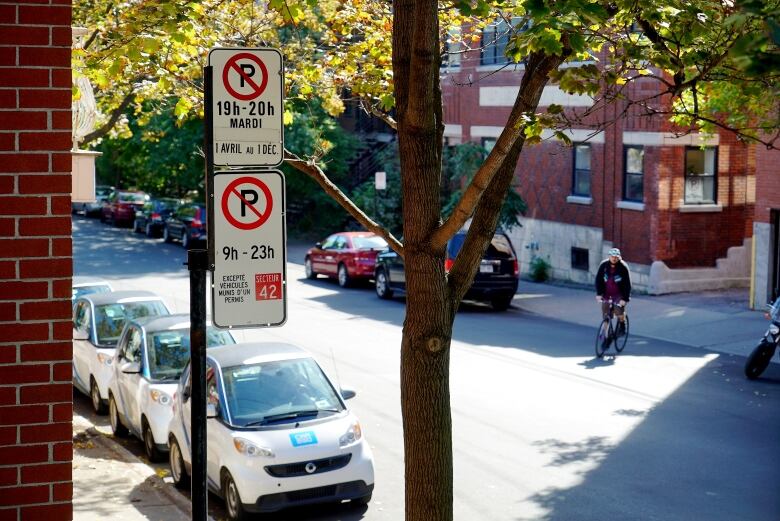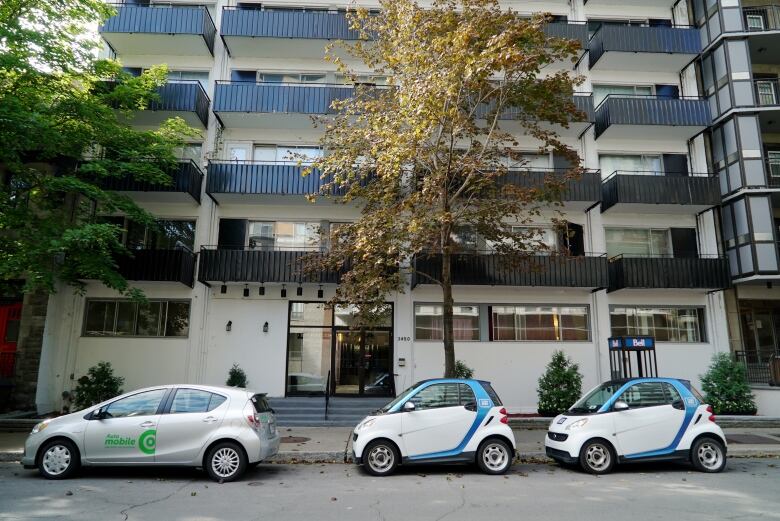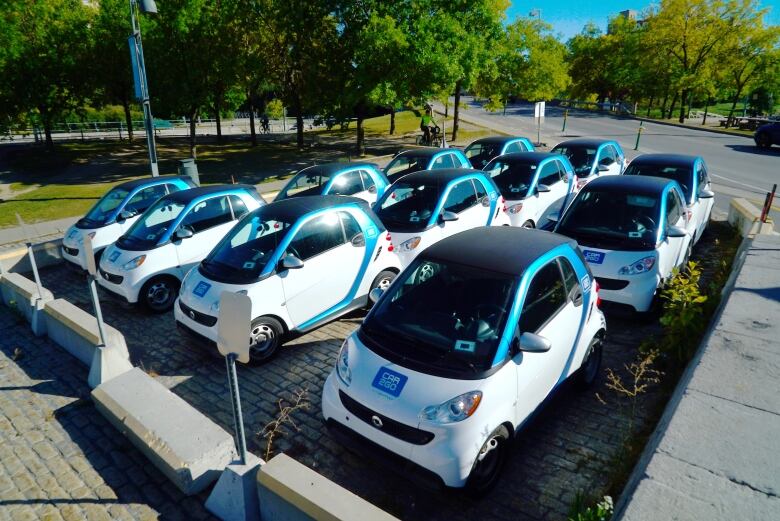Car-sharing vehicles cause parking headaches in Mile End, Milton Park
CBC/Radio-Canada compiled, analyzed car2go data to see parked vehicles' impact on some Montreal neighbourhoods

Car-sharingservices are a boon to environmentally minded commuters who spurn car ownership and to cities looking for ways to reduce traffic congestion.
But in Montreal, the popularity of services such asCommunautoandcar2gois depriving vehicle owners who live in the busy pockets of Mile End and Milton Park of parking spots ontheir own streets.
"During the day, it's full, full, full," said PierreRenzetti, who lives on St-Dominique Street in Mile End, just a stone's throw fromUbisoft'svideo-game studio.
"It's impossible to take my car to buy groceries and come back, because both sides of the street are full, full, full."

car2go in Mile End
CBC/Radio-Canada's compilation and analysis of data on the boomingcar2goservice has foundthat during working hours on weekdays in Mile End, car-sharing vehicles do, indeed, hog the parking spots reserved for residential permit holders.
Mile End is a major destination for commuters not justUbisoftemployees, but others who work in the neighbourhood's converted factories. However, it doesn't have the parking infrastructure available to commutersindowntown Montreal.
MAP: Where and when car2go vehicles are parked
The colours indicate what time of day you're most likely to findcar2govehicles parked in any onezone. Click on each circle fora chart showing the average number of cars per hour that were parked in that zone over the course of five weeks.
Downtown just steps away
The area of Milton Park dubbed the McGillghettois another area where shared vehicles take up a lot of the space set aside for residential parking at critical times.
There is demand for parking from university students and staff, not to mention from those working in nearby hospitals.
Perhaps more important, users of the car-sharing service aren't allowed to leave the vehicles in the Ville-Marie borough, south of Sherbrooke Street.
So drivers will park their shared vehiclein a residential spot in the McGill ghetto,between University Street and Parc Avenue, and walk to work or to shop downtown from there.

Universal parking sticker
Car2goandCommunautopay the City of Montreal $1,320 per vehiclefor a universal sticker, which allows drivers to park anywhere it's legal, including in spots zoned for residential parking.
Shared vehicles don't stay parked for long, but residents complain thatonce one vehicle leaves, it's quickly replaced by another.
"Just the other week, I drove by two, three times to park. Couldn't find a spot," said MichelFrchette, another Mile End resident.
"I have to park in my backyard, but in the winter it will be hard."

Explosive growth in car sharing
Car2gohas seen an explosive growth in Montreal. The company began operating here three years ago, and today itboasts 43,000 members sharing a fleet of 460 vehicles, saidgeneral managerJrmiLavoie.
Car2gois a wholly-owned subsidiary of Daimler AG, which makes the Smart cars used bycar2go, as well as Mercedes-Benz vehicles.
Its homegrown rival, Communauto, which began as a fleet of 80 vehicles in 1994, also has a one-way car-sharing service called Auto-mobile.

Itboasts similar numbers: In three years, the number of vehicles in the Auto-mobile fleet grew from30 to 450 in Montreal's eight participating boroughs.
Representatives of both companies say they haven't received complaints directly from residents of the high-use zones.
Car2go'sLavoiesaid he heard some complaints when the service was first launched, but he's had no calls from Mile End residents in the last 18 months.
"There are still some misconceptions of the benefits car2gobrings to the city," Lavoiesaid. "There's education to be done."
Communautoalso said it hasn'treceived complaints from Mile End residents.
"These cars move a lot. They don't stay parked for more than two hours and are taken by different people, unlike a private car that stays, generally, all day long," said company spokeswoman Brigitte Geoffroy.
Both companies invite residents to contact them if they have complaints. The car-sharing servicessend employees to move cars if they become a burden.
Political battlefield
Coun. Alex Norris, who representsthe Plateau Mont-Royal boroughwhere car sharing is most popular, fully supports the car-sharing concept despite the occasional problems posed by the vehicles.

But he insists the benefits outweigh the inconvenience, saying "one vehicle can be used by a number of families."
"Theera for every family to own a car is coming to end. There's no room for everyone to have a car," said Norris.
Norris'sProjet Montralhas challengedMayor Denis Coderre on his handling of thecar-sharing issue, claiming he is trying to stifle its development.
The mayor recently raised the price of universal parking stickersfrom $1,000 to $1,320 and has imposed a requirement that both services electrify their entire fleet by 2020.
A ProjetMontral administration would repeal these measuresand allow the vehicles to be parked anywhere downtown, said Norris.
ArefSalem, the member of the city's executive committee responsible for transit, said the city is trying to find a balance between car-sharing services and the needs of local residents.
Net benefit for cities
A study by the Transportation Sustainability Research Center at the University of California, Berkeleyshowed that car-sharing has helped remove thousands of cars from the five North American cities it surveyed.
Its study of 7,350 car2gomembers in Vancouver, Calgary, San Diego, Washingtonand Seattle found that, on average:
-
two to fiveper cent of members sold a car because of car2go.
-
seven to 10 per cent of members refrained from buying a car.
-
More than 28,000 fewer cars operated inthe five cities in 2015, or 7 to 11 cars per car2govehicle.
-
Greenhouse gas emissions were reduced by 2,200 to 10,000 tonnes per year, a decrease of 4 to 18 per cent per car2gohousehold.
In Calgary, the city has come up with a number of solutions tothe problemof too many parked car-sharing vehicles displacing residents' cars. There is a limit on how many car2go vehicles can be parked on any one street, and a driver who parks there anyway faces stiff fines, said Coun. Andr Chabot.
Municipal authorities have also created 150 "microstall parking zones"reserved especially for car2goSmart cars, at the end of certain streets and in places where a normal-sized car wouldn't fit.
Methodology:
Car2gocontinuouslypublishesreal-time data on its cars' locations,used by mobile apps to help users find the nearest availablevehicle.
CBC/Radio-Canada saved this data every five minutes for five weeks in July and August andanalyzedthe results with the help of Montreal data scientist Nicolas Kruchten. High-use zones were identifiedusingk-means clustering, an algorithm that identifies clusters of similar observations in large data sets. These zones represent general areas and are not exact locations of parked cars.
With files from Radio-Canada's Marie-Christine Rioux












_(720p).jpg)


 OFFICIAL HD MUSIC VIDEO.jpg)
.jpg)



























































































